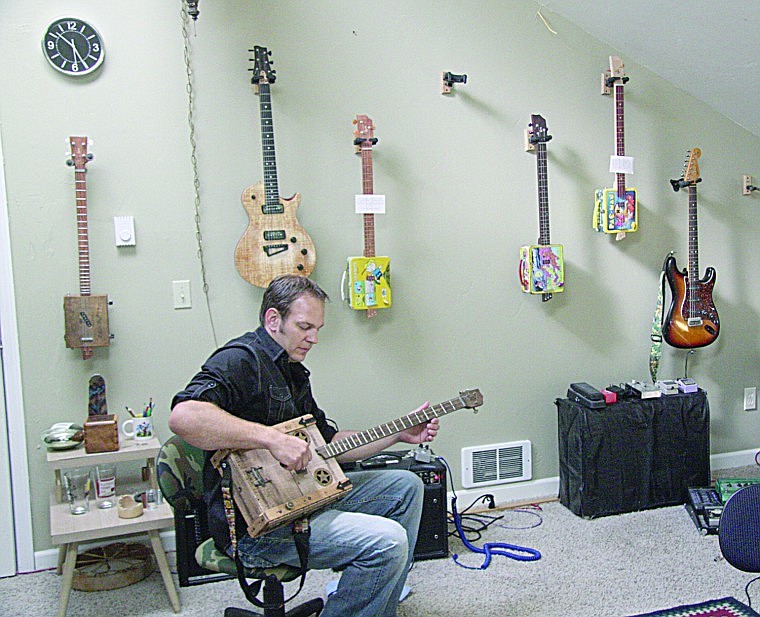Eyre guitar
POLSON — Cobbled together with ordinary household trinkets and recycled parts harvested from old instruments, Nathan Eyre’s cigar box guitars are something of a musical Frankenstein. With tuning knobs protruding from the neck in place of bolts, the resemblance to the monster is made even more striking when he uses a charge of electricity to breathe life into the odd assortment of old parts.
“They really come alive when you put electric guitar pickups in them,” Eyre says before plugging his cigar box creation into a nearby amp.
Soon enough I see - or rather, hear - what he is talking about when his simple three-stringed instrument produces a sound that brings to mind images of tumbleweed blowing past an old Western saloon.
Eyre says that a lot of people don’t suspect that his “cute” little guitars can make such a noise until they’re hooked up to the amp for a firsthand demo. After hearing them, audiences come to discover that in many ways, their sound is as unique as their appearance.
“I’ve sold by looks alone… but that (sound) is what sells them,” Eyre says of their distinctive Blues twang that would be at home in the Deep South or fitting background music for a ten-step draw in an old Western.
Eyre, who lives in Polson and teaches piano and guitar lessons for Mission Valley Music as his day job, stumbled into his moonlighting gig as a builder of cigar box guitars about four years ago, when a friend first exposed him to the instruments at a music camp where he was teaching.
Overwhelmed by the sound, it was love at first listen.
“Finally I was like, ‘I gotta build me one of those,’” says Eyre. “I grew up around woodworking stuff as a kid and so I was like ‘I can probably figure this out.’”
And he sure did.
“I wasted a lot of wood at first,” Eyre says. You wouldn’t know it by perusing his current inventory, however, as his craftsmanship and artistic flair lends each of his guitars a distinct personality.
One piece adorning the wall features a cigar box from the 1930s- back when hard times helped such instruments gain popular appeal. Eyre’s workshop wizardry is not limited solely to cigar boxes, as his artistic media also include wine boxes, vintage children’s lunch boxes featuring Scooby Doo and Pacman, and seemingly any other box-shaped item with a certain degree of panache.
One of Eyre’s personal favorites is a Texas-themed piece made from what he describes as “barn wood.” Adding to the guitar’s Lone Star flavor are bits of barbed wire, shotgun shells, and part of an old horseshoe.
The hodgepodge guitars are not new to the world of music. Eyre says that as far back as the 19th century, his acoustic predecessors built their guitars with everything ranging from coat hangers and screen-door wire to broomstick handles and nails. Over time, those resourceful musicians formed bands by teaming their homemade guitars with makeshift banjos, violins and washboards for percussion. Eyre credits these backcountry bands consisting of so-called “mountain instruments” as pioneers of the Blues genre.
“These are like your early, early blues instruments,” Eyre says of cigar box guitars.
“People think of Blues (with) Eric Clapton and B.B. King, but this actually dates back to the 1930s.”
Since that time, cigar box guitars fell out of favor and became a relic from a bygone era, before internet forums such as Cigar Box Nation helped to spark a renaissance in recent years.
Eyre now proudly counts himself among the dedicated community of artists leading the cigar box revival. After building one for himself and playing it at various shows, people started to ask if he could make one for them.
“So, just by accident it turned into a business,” Eyre says.
The hunt for new building material takes Eyre to the far reaches of eBay and area pawn shops. He also admits to getting some help from his mother, who is an “avid rummage saler.”
His guitars typically fall in the $250-$600 price range, and he sells “at least a dozen a year” with sales peaking around Christmastime and the summer tourist season. Eyre says that his primary market is among fellow musicians, though he will occasionally strike a deal with wine or antique enthusiasts.
Eyre’s customers dot the globe, with his website attracting business from Arizona, Florida and even London. A Danish visitor to the area also made sure to buy one after hearing Eyre play on the streets of Polson.
Though Eyre is certainly making a name for himself in the trenches of the “cigar box revolution,” he prefers to keep it as a side project.
“I treat is as a hobby, and treat it as extra money. I don’t depend on it, which makes it fun,” he says.
“That’s why it’s such a great hobby - I can sit and play my own piece of art.”
Some of Eyre’s finished products can be seen on display at Big Sky Bistro and at The Cottage on Main Street. He also plays live music at restaurants and parties throughout the valley, making sure to feature the smoky riffs from his cigar box guitar in the middle of his set.
For those who might not pay full sticker price for a guitar, last winter Eyre spent some time in the studio making a CD of cigar box music, which he sells on the side at venues where he plays. He is also considering writing a an instructional book about how to play cigar box guitars or how to build your own.
To learn more about Eyre’s projects, visit www.missionvalleymusic.com.





